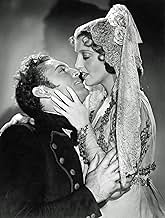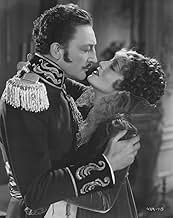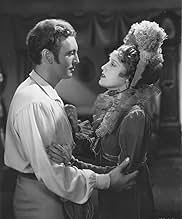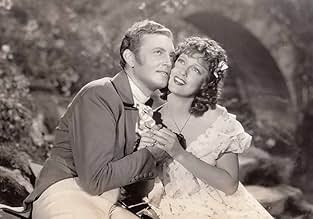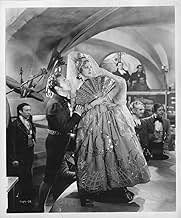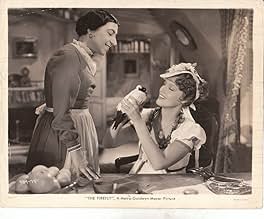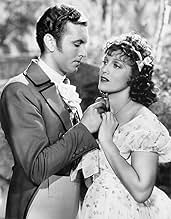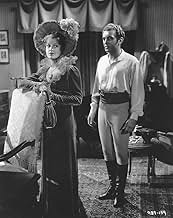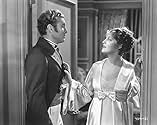Durante las guerras napoleónicas, las aventuras y amores de una espía y cantante de cabaret española.Durante las guerras napoleónicas, las aventuras y amores de una espía y cantante de cabaret española.Durante las guerras napoleónicas, las aventuras y amores de una espía y cantante de cabaret española.
- Dirección
- Guionistas
- Elenco
- Premios
- 3 premios ganados en total
Douglass Dumbrille
- Marquis de Melito
- (as Douglas Dumbrille)
Tom Rutherford
- King Ferdinard
- (as Tom Rutherfurd)
Corbet Morris
- Duval
- (as Corbett Morris)
Victor Adams
- Jail Guard
- (sin créditos)
Monya Andre
- Civilian Wife
- (sin créditos)
Sam Appel
- Fruit Vendor
- (sin créditos)
Pilar Arcos
- Gypsy
- (sin créditos)
Hooper Atchley
- French Soldier Requesting Flowers
- (sin créditos)
Opiniones destacadas
I am told that the original plot of The Firefly has seen on Broadway back in 1912 had absolutely nothing to do with the Peninsular Campaign of the Napoleonic Wars. Hard to believe because the plot here seems so right.
The core of the plot is duty to one's country. Though Allan Jones and Jeanette MacDonald are on opposite sides and love each other, at some point each betrays the other at some point in the movie to gain a tactical advantage for France or Spain.
The Rudolf Friml-Otto Harbach-Oscar Hammerstein II, is mostly retained for the movie. One new song, based on a Friml instrumental composition called Chanson, is given a lyric by Bob Wright and Chet Forrest and arranged by MGM's house composer Herbert Stothart. Their combined efforts yielded The Donkey Serenade and provided Allan Jones a signature song for the rest of his career.
Jeanette was taking a rest from her usual singing partner, Nelson Eddy, and her teaming with Jones was felicitous. They are a pair of winning songbirds. Maybe had Jones stayed with MGM, he and MacDonald might have made some more films together. Maybe he might have played some of the parts that Nelson Eddy did opposite her. But he probably was right in thinking he'd always be number 2 at MGM, so he moved to Universal.
Beautiful singing and a decent plot in this one. Go see it.
The core of the plot is duty to one's country. Though Allan Jones and Jeanette MacDonald are on opposite sides and love each other, at some point each betrays the other at some point in the movie to gain a tactical advantage for France or Spain.
The Rudolf Friml-Otto Harbach-Oscar Hammerstein II, is mostly retained for the movie. One new song, based on a Friml instrumental composition called Chanson, is given a lyric by Bob Wright and Chet Forrest and arranged by MGM's house composer Herbert Stothart. Their combined efforts yielded The Donkey Serenade and provided Allan Jones a signature song for the rest of his career.
Jeanette was taking a rest from her usual singing partner, Nelson Eddy, and her teaming with Jones was felicitous. They are a pair of winning songbirds. Maybe had Jones stayed with MGM, he and MacDonald might have made some more films together. Maybe he might have played some of the parts that Nelson Eddy did opposite her. But he probably was right in thinking he'd always be number 2 at MGM, so he moved to Universal.
Beautiful singing and a decent plot in this one. Go see it.
If it wasn't for "Donkey Serenade", this would have been a total loss as a piece of gaudy MGM entertainment for the masses in the 1930s. JEANETTE MacDONALD gives her all as a sexy spy who tries getting potentially harmful information from French officers, but it's all pretty preposterous and finally much too long for sustained interest.
The only sequence that comes off as completely charming is the "Donkey Serenade" episode with ALLAN JONES singing his heart out as he rides a dusty trail following her carriage. Jones is a fine match for MacDonald but probably left MGM when he realized it was Nelson Eddy's territory.
The score is kind of lackluster, the sets are opulent in typical MGM grand style manner, but the plot is never lively enough to keep one's attention riveted on the plodding story of spies and counter-spies in ye olde Spain. Everyone tries hard, but it just seems to stall somewhere near the middle and never recovers.
Trivia: Did Jeanette MacDonald ever show her real hair in a costume film? She must wear at least 25 wigs and hairdos in this film alone, changing her far from simple hairstyles from scene to scene more often than Lana Turner ever changed her costumes in glamorous roles. There must have been a special Jeanette wig department at Metro just for the occasion.
The only sequence that comes off as completely charming is the "Donkey Serenade" episode with ALLAN JONES singing his heart out as he rides a dusty trail following her carriage. Jones is a fine match for MacDonald but probably left MGM when he realized it was Nelson Eddy's territory.
The score is kind of lackluster, the sets are opulent in typical MGM grand style manner, but the plot is never lively enough to keep one's attention riveted on the plodding story of spies and counter-spies in ye olde Spain. Everyone tries hard, but it just seems to stall somewhere near the middle and never recovers.
Trivia: Did Jeanette MacDonald ever show her real hair in a costume film? She must wear at least 25 wigs and hairdos in this film alone, changing her far from simple hairstyles from scene to scene more often than Lana Turner ever changed her costumes in glamorous roles. There must have been a special Jeanette wig department at Metro just for the occasion.
The reviews here that say the movie is too long (or "too long for a 1930s musical") must be written by people from fleet street. The movie is as long as it needs to be for a nicely complex storyline, nicely told with lots and lots of beautiful music to entertain, and Jeanette even gets a lot of dancing and wonderful non-dance choreography through crowds of men that she tantalizes with her charm.
The love scenes between MacDonald and Jones are funny, sweet, captivating, and the necessary betrayals are handled well and understandably from both sides.
I loved every minute of this film and would not have wanted it shortened. All the songs are hummable and lively/romantic. MacDonald's intelligence and sense of humor underlie everything she does, as when she says to Jones after his beautifully sung love song, "Well, perhaps I shouldn't tell you this, but you know that part where you sing, 'My heart's your throne dear, my heart's your throne dear, There you shall rule alone...' with the music building just before the high note?"
"Yes?"
"I was wondering... but, no, perhaps I shouldn't tell you."
"Tell me."
"Well, I was wondering ... if you were going to make it."
Or when Jones complains to her, "You're always saying goodbye," and she replies, "All right then, I won't say goodbye. I'll just ... go."
Her comic timing is lovely.
In fact, she has never been lovelier than in this movie, and the two of them together are just a lot of doggone fun and romance.
The love scenes between MacDonald and Jones are funny, sweet, captivating, and the necessary betrayals are handled well and understandably from both sides.
I loved every minute of this film and would not have wanted it shortened. All the songs are hummable and lively/romantic. MacDonald's intelligence and sense of humor underlie everything she does, as when she says to Jones after his beautifully sung love song, "Well, perhaps I shouldn't tell you this, but you know that part where you sing, 'My heart's your throne dear, my heart's your throne dear, There you shall rule alone...' with the music building just before the high note?"
"Yes?"
"I was wondering... but, no, perhaps I shouldn't tell you."
"Tell me."
"Well, I was wondering ... if you were going to make it."
Or when Jones complains to her, "You're always saying goodbye," and she replies, "All right then, I won't say goodbye. I'll just ... go."
Her comic timing is lovely.
In fact, she has never been lovelier than in this movie, and the two of them together are just a lot of doggone fun and romance.
France and England are at war. Napoleon has placed troops in Spain "to protect the Spanish" in case England invades.
There is a beautiful cantina singer (and dancer!) named Nina Maria (Jeanette MacDonald) whom men fight over. She works as a spy for Spain. When Napoleon invites Ferdinand--who appears guileless--to France for a meeting, Nina Maria must leave for France immediately to determine if Napoleon's intentions are honorable.
She is pursued there by Don Diego (Allan Jones), a man smitten by the senorita. Along the way, he tries to charm her by singing "The Donkey Serenade"--one of the most memorable moments in the film.
When they arrive in Bayonne, France, things get complicated. The senorita discovers someone is on to her. The love story becomes more political as Nina Maria must make alliances based on trust. Will she let her heart guide her actions? What is Napoleon's true objective?
The two leads are excellent. Much of the surrounding cast portray military characters and they are very strong.
The lavish sets and a large number of extras give the film a feeling of richness, as when Joseph Napoleon and his military escort ride into Madrid.
Part romance, part political intrigue, "The Firefly" entertains while Jeanette MacDonald shines.
There is a beautiful cantina singer (and dancer!) named Nina Maria (Jeanette MacDonald) whom men fight over. She works as a spy for Spain. When Napoleon invites Ferdinand--who appears guileless--to France for a meeting, Nina Maria must leave for France immediately to determine if Napoleon's intentions are honorable.
She is pursued there by Don Diego (Allan Jones), a man smitten by the senorita. Along the way, he tries to charm her by singing "The Donkey Serenade"--one of the most memorable moments in the film.
When they arrive in Bayonne, France, things get complicated. The senorita discovers someone is on to her. The love story becomes more political as Nina Maria must make alliances based on trust. Will she let her heart guide her actions? What is Napoleon's true objective?
The two leads are excellent. Much of the surrounding cast portray military characters and they are very strong.
The lavish sets and a large number of extras give the film a feeling of richness, as when Joseph Napoleon and his military escort ride into Madrid.
Part romance, part political intrigue, "The Firefly" entertains while Jeanette MacDonald shines.
Allan Jones has a wonderful voice, but a rather bland personality. He is no match for Jeannette MacDonald, who here gives her best dramatic performance on screen with not much to play against. Warren William is the villain and he has more presence than Jones.
Jones and MacDonald play spies, he for France and she for Spain, during Napoleon's attempt to kidnap the King of Spain and add that country to his fiefdom. There is much intrigue and a few songs along the way, the best known being The Donkey Serenade and Gianina Mia.
The problem lies in the length of the scenes and musical numbers. This film could easily have had half an hour snipped out of it, bringing it closer to conventional playing times of the period. At 2 hours, 10 minutes, it is just too long. And it is heavy-handedly directed and written.
The original operetta from 1912 had a few good tunes. Friml was third in line of talent, behind Romberg and Herbert, as America's trio of operetta composers. The score is just not good enough to mount a major film around.
MacDonald is always worth seeing, as she either matches or outshines her best material. This one, like Broadway Serenade a few years later, was not one of her best films and is recommended for her fans and those of Jones only.
Jones and MacDonald play spies, he for France and she for Spain, during Napoleon's attempt to kidnap the King of Spain and add that country to his fiefdom. There is much intrigue and a few songs along the way, the best known being The Donkey Serenade and Gianina Mia.
The problem lies in the length of the scenes and musical numbers. This film could easily have had half an hour snipped out of it, bringing it closer to conventional playing times of the period. At 2 hours, 10 minutes, it is just too long. And it is heavy-handedly directed and written.
The original operetta from 1912 had a few good tunes. Friml was third in line of talent, behind Romberg and Herbert, as America's trio of operetta composers. The score is just not good enough to mount a major film around.
MacDonald is always worth seeing, as she either matches or outshines her best material. This one, like Broadway Serenade a few years later, was not one of her best films and is recommended for her fans and those of Jones only.
¿Sabías que…?
- TriviaThe song "The Donkey Serenade" was not in the original stage production. It was written for the film, but the music was adapted from the song "Chansonette," from the stage version of "The Firefly."
- ErroresWhen by the bridge we see a female with very long black plaits walking with her beau across the bridge. Not long after we see a closer shot of them about to walk across the bridge.
- Citas
Don Diego: You have one bad habit.
Nina Maria Azara: Oh, yes? What?
Don Diego: You're always saying good-bye.
Nina Maria Azara: Very well then, I won't say good-bye. I'll just go!
- Créditos curiososEach time the dancing girls dance across the screen, a new screen credit is revealed.
- ConexionesFeatured in MGM Parade: Episode #1.25 (1955)
- Bandas sonorasLove Is Like a Firefly
(uncredited)
Music by Rudolf Friml
Lyrics by Bob Wright and Chet Forrest
Sung by Jeanette MacDonald
Selecciones populares
Inicia sesión para calificar y agrega a la lista de videos para obtener recomendaciones personalizadas
Detalles
- Fecha de lanzamiento
- País de origen
- Idiomas
- También se conoce como
- Tarantela
- Locaciones de filmación
- Alabama Hills, Lone Pine, California, Estados Unidos(Donkey Serenade sung)
- Productora
- Ver más créditos de la compañía en IMDbPro
- Tiempo de ejecución2 horas 11 minutos
- Relación de aspecto
- 1.37 : 1
Contribuir a esta página
Sugiere una edición o agrega el contenido que falta

Principales brechas de datos
By what name was The Firefly (1937) officially released in India in English?
Responda

